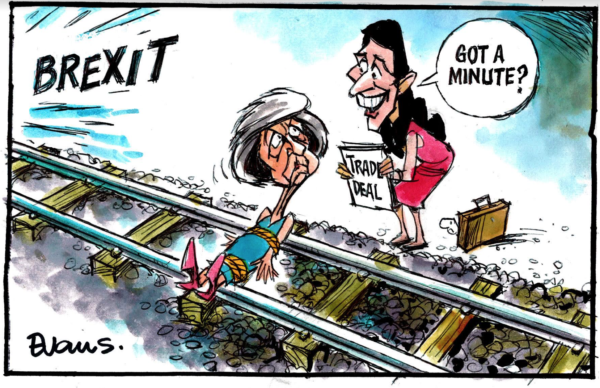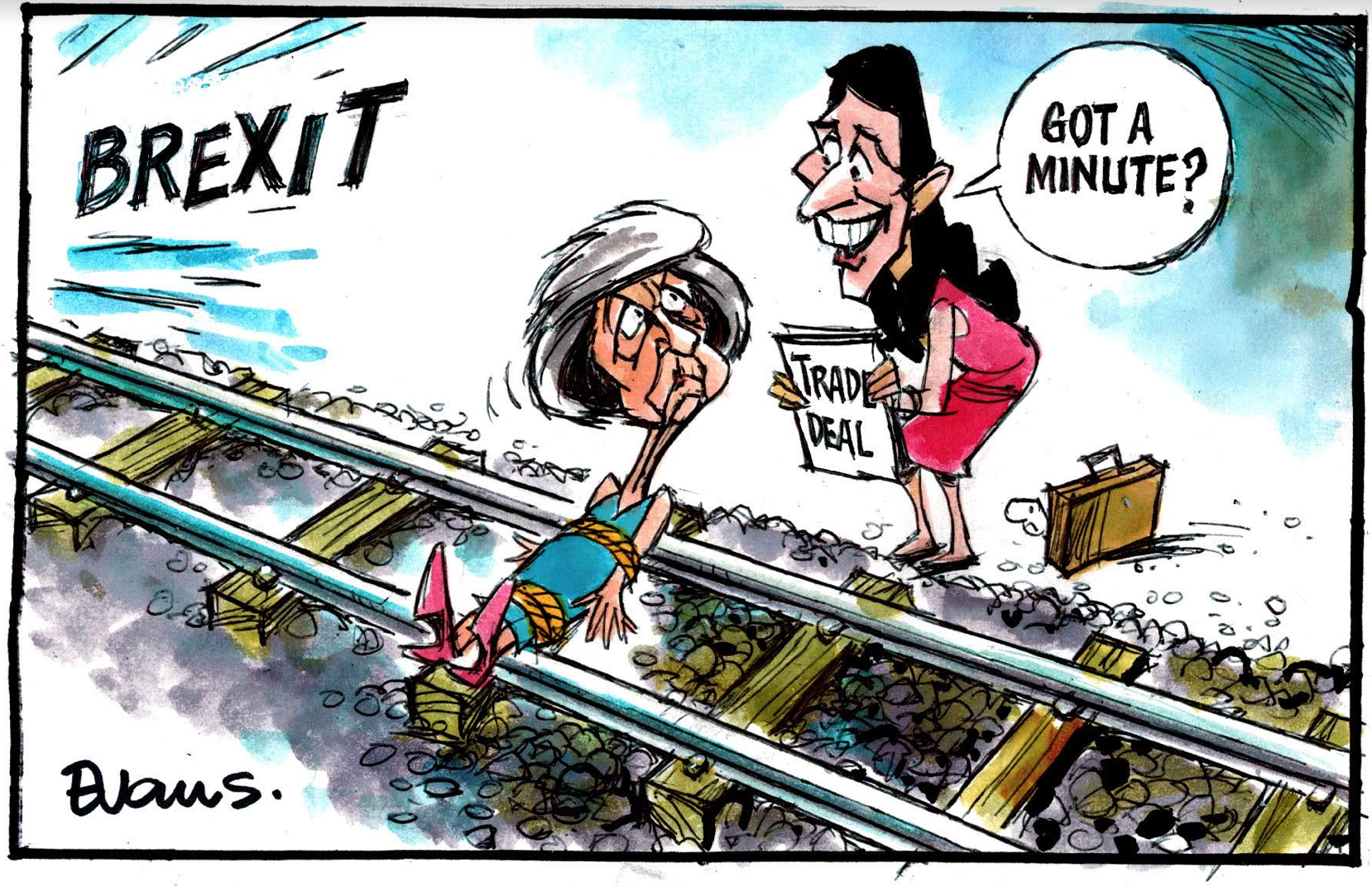
The first panel at the hui in October 2018 on What an Alternative and Progressive Trade Strategy for New Zealand Should Look Like was on the Big Picture, with an overview on foreign policy, labour and women’s perspectives. This is the exchange on foreign policy issues.
Terence O’Brien
Former New Zealand Diplomat and Founding Director of the Centre for Strategic Studies, Victoria University of Wellington
Laila Harré: what do you see as the key developments, changes and challenges in the geopolitical environment and how do you see the current establishment in Aotearoa understanding, or not, the developments in that area and what some of the implications may be for your thinking today?
Terence O’Brien: We are living in a world at a time where the distribution of global power and influence is fundamentally changing. Some of the themes Jane Kelsey mentioned underline that fact: the rise of East Asia led by China. The fact of Brexit and Britain striking out on its own in the world, which is going to have consequences not only for Europe but also for Britain itself obviously. The emergence of the fast growing successful East Asian economies when fundamental things like technology, artificial intelligence, cyberspace and so on are also impacting on the way in which countries relate to each other internationally. So I think there is a sense that the cup is running over. This uncertainty is severely compounding the task we have today to look at an alternative and progressive trade strategy.
Quite frankly as Jane mentioned, the whole framework for international trade is under considerable stress at the moment. In particular that stress comes from the US where President Trump feels that he must correct the imbalances and the way the rest of the world has “taken advantage of the US” with a series of cascading trade actions. At a time when there is concern about the future of the international rules order in the world, which is particularly sheeted home to China because of its actions in the South China Sea, the fact is that as great a menace to the international order comes from America’s handling of the international trade agenda and its disregard of international institutions, of human rights, you name it. There is a deep antipathy or ambivalence for the multilateral system emanating from Washington.
It’s vitally important that the world system is modified, changed, to recognise the emergence of the newly successful emerging countries, the Chinas and Indias of this world. But the signs are that this is only going to occur with great difficulty and very slowly because the US is resisting quite strongly these changes. Vice-President Pence recently made a speech which was the first really fully dedicated to America’s policies towards China. If you want to understand the dimensions of the problem, I recommend you look that up. It actually states that in every domain of international interaction the Americans intend to contain China and press China back. That’s the American agenda whether in politics, trade, commerce, technology, space – in every dimension of international relations, this is the American policy.
The NZ government as yet has not developed a comprehensive, coordinated response to this change. We have a very interesting speech recently by the Prime Minister in New York to the UN General Assembly. It was the first exposition before the word of the NZ position on these issues. But she didn’t take the opportunity to do that. Rather than to explain that, she branched into describing what NZ is and what it can bring to the international relations table, what kind of country she is trying to encourage us to evolve, in what way. It was quite the contrast to the other speeches made at the General Assembly, which were much more traditional. So she doesn’t give us an indication of how NZ is reacting to the changes that we’ve been talking about. And the only reaction we have officially is the so-called strategic policies review released a couple of months ago by Defence Minister Ron Mark, where the government is justifying the acquisition of some fairly expensive defence equipment by saying that it’s vitally important that NZ deepens its security relationship with ‘traditional allies’. And of course there is one very large partner they have in mind.
So on one hand you have the defence/security community stating that we need to deepen our relationship with our traditional friends, at the very same time as the non-traditional friends are the ones upon whom NZ increasingly relies for its prosperity and its security. And the foreign policy community in NZ – MFAT and so on – have not actually pronounced officially on what their foreign policy view is of the changes. We’ve only got the defence and security perspective. We’ve got a gap and that gap needs to be filled. No one can pretend that it’s easy and that there is a single bullet. One idea and that’s it. It’s a process of slow, steady, but self-confident adjustment, and the courage of convictions.
Laila: When we look at gender or labour in NZ Aotearoa developing our own agenda for how we want to see how things develop, how realistic is that in terms of the global scene that you outlined? What do China and the US expect, given the bipolar scenario you painted? What’s their expectation of NZ’s approach to trade in relation to them? Do we have to take sides? Or don’t we know?
Terence: The non-government inputs to trade occur at two levels: the national level that occurs within the country and the degree to which the government of the day accepts and welcomes inputs; and then at the international level as part of the NGO effort on the margins of large conferences like climate change, trade or human rights. So there are two levels at which non-government input can be made, provided the governments individually and collectively are in the right frame of mind to permit that.
On the broader question of taking sides between China and the US – when we are looking at this progressive and new policy we must be careful not to throw the baby out with the bathwater. The WTO is something with many faults, many warts and all, but it does have one or two capabilities which we should be very careful about destroying. And that mainly is the conflict resolution. When a dispute occurs between two states, there are two ways of resolving it. One is that two states set up a panel and adjudicate the problem. The other is to have an independent arbitration system where you can bring dispute settlement talents from all over – that’s what the WTO provides. In this highly uncertain time we are now in, we should be careful about not losing that international role of the WTO which is precisely what Trump is after. The Americans want to neutralise the whole WTO role in dispute settlement. That’s one part of the WTO that NZ should be striving to retain. There are other policies, philosophies, agendas which are behind WTO that are not necessarily so [indecipherable] but ones that which you have pursued through the processes that it has.
I don’t see us destroying the WTO and replacing something in its place. That would be very dangerous because, as we are watching now out of Washington, the Americans intend to set the agenda in every domain. Pence’s speech shows they intend to prevail in all places. The Europeans to give them their due, do defend the multilateral trading system in terms of dispute resolution. But at the moment they are desperately concerned with their own future, the future cohesion of Europe, the future of Britain, so their attention is focused on their own game rather than a larger perspective. NZ has to play it very nimbly and avoid, to the extent that it can, taking sides. But in the trade arena the negotiating of agreements with another country is actually the way you take sides.
On this question of taking sides, NZ should certainly be on the side of modulating change and refining the international institutions to allow the BRICS (Brazil, Russia, India, China, South Africa) a greater say in the way those institutions are run. The Americans and Europeans are not prepared to see that, at least yet.
And on the Australia-NZ-Pacific relationships, there is a worry or concern. Australia is a country in the Pacific but not of the Pacific, whereas NZ is both. There is a trend that is now quite apparent that Australia tends to see its relationships with the Pacific in ‘security’ terms – the perceived threat to Australia is the main force that drives their policy position towards the South Pacific. NZ has a real challenge in resisting the idea of looking at the Pacific through an exclusively military, security, defence lens which the Australians are doing now. So the NZ-Australian relationships are going to be tested as well in this new search for alternative and progressive trade strategies.
We have reached a singularly delicate moment in modern international relations, which is the very time we are trying to work out among ourselves a new and progressive trade strategy. It is absolutely vital that we do that. But we shouldn’t under-rate the problems out there which all revolve around whether large major powers can accept that there is a fundamental shift occurring in the world order and they need to adjust to that.


